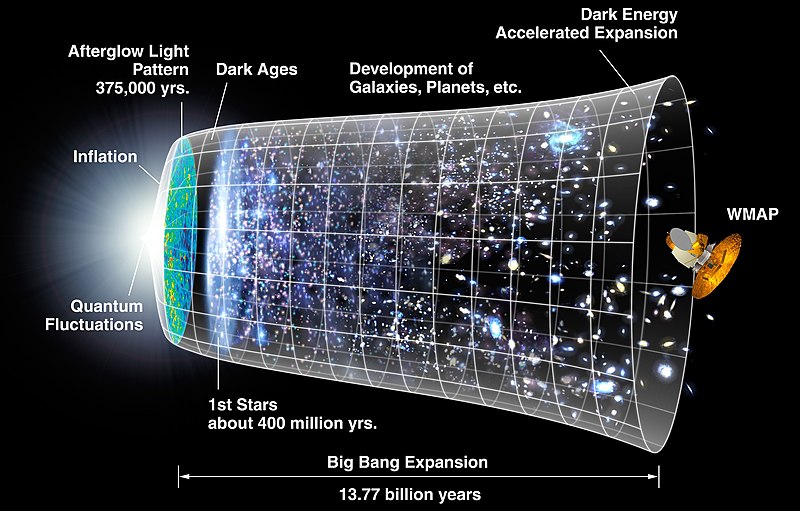
Caption: An illustration of the evolution of the observable universe from the hypothetical inflation era (cosmic time zero) to cosmic time present which is equal to the age of the observable universe = 13.797(23) Gyr (Planck 2018) (see Planck 2018: Age of the observable universe = 13.797(23) Gyr).
Features:
- In the image, the 2-dimensional
cosmic time slices represent 3-dimensional
space at each epoch.
The slices exponential grow from the beginning to the end of hypothetical inflation era. After that the the slices grow more slowly with Friedmann equation evolution as given by the Λ-CDM model which consistent so far with the observed expansion of the universe.
The grow illustrated in the image is probably not-to-scale.
- The expansion of the universe---which
means the growth of space
itself which is explainable
by the theory of
general relativity of
Albert Einstein (1879--1955).
The growth of space is just a scaling up of space. You and me, the planets, the stars, the galaxies, and probably the galaxy groups and galaxy clusters are NOT expanding---all of these are gravitationally bound (or otherwise bound)---it's the space between the galaxies and/or galaxy groups and clusters that is growing.
Before stars and galaxies formed, the growth just caused the cosmic density of mass-energy to decrease.
- The inflation may
have started from a tiny region of
false vacuum universe
which may also be the
multiverse.
But that is a very speculative theory.
Maybe TOE will prove or disprove the multiverse theory. But might depend on what one counts as an explanation.
- In yours truly's view
the Big Bang itself is the
early post inflation
period in which the
light elements
(i.e.,
hydrogen (H-1),
deuterium (D, H-2),
helium (He-3),
helium-4 (He-4),
and
lithium-7 (Li-7))
were synthesized: i.e.,
Big Bang nucleosynthesis era
(cosmic time ∼ 100--1000 s = 1.7--17 m).
Immediately after this phase, mass-energy of the observable universe consisted of the matter (i.e., the light elements), cosmic background radiation (CBR) (a blackbody radiation field in in thermodynamic equilibrium with the matter), cosmic neutrino background, dark matter (still somewhat hypothetically), and dark energy (still somewhat hypothetically).
UNDER RECONSTRUCTION BELOW
The rapid phase is cosmic inflation from a minute early universe (embedded in the multiverse if that exits) and the slow phase is ordinary cosmology from a hot dense phase (the Big Bang) to the present.
In the Big Bang phase, a hot gas of mainly hydrogen and helium forms.
The gas cools with the expansion of the universe.
Gravity causes the gas to clump into galaxy superclusters, galaxy groups and clusters, galaxies and stars.
-
Initial density perturbations after the
inflation
seed the growth of clumps.
Denser regions grow denser and less dense regions grow less dense.
Cosmic evolution before the Big Bang (i.e., the multiverse and inflation) is much more speculative---one of those deep mysteries of modern physics.
It wouldn't be extremely surprising if the multiverse and inflation were just plain wrong.
Theories have different statuses as mentioned above.
Image link: Wikipedia.
Local file: local link: cosmos_historyv2_version2.html.
File: Cosmology file: cosmos_historyv2_version2.html.